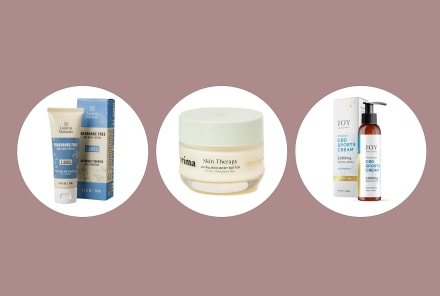Advertisement
The 5 Most Annoying Pregnancy-Related Skin Problems + What To Do About Them


A precious bundle of joy is headed your way and you couldn’t be more thrilled. You’re ready to begin this exciting new adventure and enjoy every step of motherhood that’s waiting for you. There’s only one problem. That "new mother glow" that you’ve heard about from family and friends and that you’ve seen in movies and magazines is nowhere to be found. Instead, you find yourself undergoing radical skin changes you weren’t planning on—skin changes you’d rather do without.
Here are the five most annoying skin problems women deal with during their pregnancy, and what you can do to safely remedy the problems without further irritating your skin or harming your baby.
Acne:
If you experience constant stress on a day-to-day basis, your oil glands will work harder as the tiny receptors on these cells are stimulated to produce more oil. This in turn causes the pores to open, and the pH of the surface of the skin changes1. The result? Breakouts. It can be challenging to overcome stress during pregnancy, especially if you’re regularly nauseated, fatigued, and dealing with other responsibilities as well such as work, other children, or family issues. It’s absolutely vital, however, to try to find a balance.
Top Tip: Set a quiet period of time each day when you can simply look after yourself and relax. Use lavender oils and chamomile tea to help you sleep at night. Drink water constantly to stay hydrated and to remove wastes and toxins from your body. And avoid yeasty and sugary foods as much as you can. As for those pesky pimples, tea tree oil can help to treat acne. Don’t touch, pick, or squeeze your pimples either. Instead, wash your face with a lactic acid based cleanser twice a day and use steam to clear clogged pores. Believe it or not, simply staying hydrated and using gentler products on your skin will be more effective than using hard, harsh scrubs or products—a good vitamin B and C serum will especially help. If you're looking for a full list of what products can and can't be used during pregnancy, this study will be useful.2
Rough Skin:
Your developing baby needs water and nourishment, so it’s no surprise that it takes all it needs from you. If your skin is not in ideal health, dehydration typically happens more easily. This causes uneven tones, dry texture, and more breakouts than usual.
Top Tip: A vegan lactic-based cleanser like Osea's Ocean Cleanser ($44) used twice daily can work wonders. Besides keeping your skin and pores clean, lactic acid helps to repair cell walls, which ensures the water needed in the cell stays there. As a result, your skin becomes more hydrated, feels smoother, and is less likely to have milia, blackheads, and breakouts.
Itchy Abdomen & Stretch Marks:
As the skin on your stomach stretches, it can become irritatingly itchy, often due to dryness. There are many other physiologic changes influenced by the changing hormonal milieu of pregnancy, as well. Diseases specifically associated with pregnancy can include autoimmune conditions, like the rare pemphigoid gestationis, or dermatologic diseases like atopic dermatitis.
Massaging an organic oil, cream, or lotion at least once a day can help to moisturize your stomach, breasts, hips, and thighs. There are even special organic breast and belly balms that can nourish and feed your skin with regenerative oils, butters, and extracts from flowers, fruits, seeds, and nuts. Try Zoe Organics Belly Butter ($20) or Erbaviva Lotion ($18)—or opt for a warm oatmeal bath to soothe the itchiness.
Top Tip: It bears repeating: Make sure you’re drinking lots of water. This helps to keep your skin hydrated. You may also try running a humidifier in your bedroom at night to help your body keep in as much moisture as possible. It's important that if the itch is accompanied by a new and evolving rash or worsening of an existing skin condition, that you go get checked by a dermatologist.
Skin Sensitivities:
During pregnancy, a woman’s skin becomes incredibly sensitive. Normal, everyday tasks like face scrubs might result in skin becoming red more easily and may even feel painful at times. Even perfumed lotion can cause irritation and nausea. Be gentle with your skin and opt for unscented and more natural-based products.
Top Tip: Another matter to be mindful of: During your pregnancy, you should stay out of the sun as much as possible. Your surging hormones make you susceptible to dark patches on your skin, which are triggered by sun exposure, and it’s also much easier for you to burn during pregnancy. UV protection, therefore, is absolutely essential. Make a zinc-based sunblock or moisturizer part of your daily skin care routine every day—no matter the weather. Wearing hats, sunglasses, and other protective clothing can supplement your SPF application.
Hyperpigmentation & Melasma:
Hyperpigmentation is a condition where the skin darkens because of an increase in melanin, the substance in the body that is responsible for color (pigment). As you undergo hormonal changes,3 the body temporarily increases its production of melanin. As a result, you’ll notice areas of your body darkening such as your neck, armpits, and nipples. Melasma, meanwhile, is a form of hyperpigmentation. It’s characterized by tan or brown patches that can usually be found on the face, a condition so common among pregnant women that it's called "the mask of pregnancy."
Top Tip: Not a lot can be done during pregnancy to prevent hyperpigmentation or melasma, but being vigilant about UV protection can make a difference. Wearing hats and a zinc-based sunblock, therefore, are must-haves. Additionally, try to limit your exposure to the sun between the hours of 10 a.m. and 2 p.m. and add antioxidant rich foods, like colorful fruits and veggies, to your diet.
The most important thing to remember about skin care during pregnancy is to nourish your skin as much as possible. Take care with the type of products you choose as well (no harmful ingredients that your growing baby will end up absorbing). Always opt for organic products when possible. Finally, keep in mind that these skin changes you experience during pregnancy are only temporary for the most part. Once you deliver your healthy baby in nine months, these common but short-lived issues tend to subside, freeing you up to enjoy motherhood and your new special little one!
Watch Next
Enjoy some of our favorite clips from classes
Enjoy some of our favorite clips from classes
What Is Meditation?
Mindfulness/Spirituality | Light Watkins
Box Breathing
Mindfulness/Spirituality | Gwen Dittmar
What Breathwork Can Address
Mindfulness/Spirituality | Gwen Dittmar
The 8 Limbs of Yoga - What is Asana?
Yoga | Caley Alyssa
Two Standing Postures to Open Up Tight Hips
Yoga | Caley Alyssa
How Plants Can Optimize Athletic Performance
Nutrition | Rich Roll
What to Eat Before a Workout
Nutrition | Rich Roll
How Ayurveda Helps Us Navigate Modern Life
Nutrition | Sahara Rose
Messages About Love & Relationships
Love & Relationships | Esther Perel
Love Languages
Love & Relationships | Esther Perel
What Is Meditation?
Box Breathing
What Breathwork Can Address
The 8 Limbs of Yoga - What is Asana?
Two Standing Postures to Open Up Tight Hips
How Plants Can Optimize Athletic Performance
What to Eat Before a Workout
How Ayurveda Helps Us Navigate Modern Life
Messages About Love & Relationships
Love Languages
Advertisement

8 Dietitians Share The Nutrition Advice They Actually Follow
Molly Knudsen, M.S., RDN

Why Women Are Twice As Likely To Struggle With Depression & Anxiety
Phyllis E. Greenberger, MSW

8 Dietitians Share The Nutrition Advice They Actually Follow
Molly Knudsen, M.S., RDN

Why Women Are Twice As Likely To Struggle With Depression & Anxiety
Phyllis E. Greenberger, MSW













